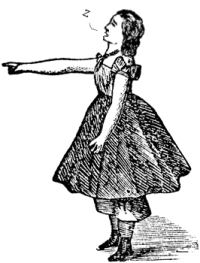 Does the idea of unconscious free will even make sense? Paula Droege, in the recent JCS, seems to think it might. Generally experiments like Libet’s famous ones, which seemed to show that decisions are made well before the decider is consciously aware of them, are considered fatal to free will. If the conscious activity came along only after the matter had been settled, it must surely have been powerless to affect it (there are some significant qualifications to this: Libet himself, for example, considered there was a power of last-minute veto which he called ‘free won’t’ – but still the general point is clear). If our conscious thoughts were irrelevant, it seems we didn’t have any say in the matter.
Does the idea of unconscious free will even make sense? Paula Droege, in the recent JCS, seems to think it might. Generally experiments like Libet’s famous ones, which seemed to show that decisions are made well before the decider is consciously aware of them, are considered fatal to free will. If the conscious activity came along only after the matter had been settled, it must surely have been powerless to affect it (there are some significant qualifications to this: Libet himself, for example, considered there was a power of last-minute veto which he called ‘free won’t’ – but still the general point is clear). If our conscious thoughts were irrelevant, it seems we didn’t have any say in the matter.
However, this view implies a narrow conception of the self in which unconscious processes are not really part of me and I only really consist of that entity that does all the talking. Yet in other contexts, notably in psychoanalysis, don’t we take the un- or sub-conscious to be more essential to our personality than the fleeting surface of consciousness, to represent more accurately what we ‘really’ want and feel? Droege, while conceding that if we take the narrow view there’s a good deal in the sceptical position, would prefer a wider view in which unconscious acts are valid examples of agency too. She would go further and bring in social influences (though it’s not entirely clear to me how the effects of social pressure can properly be transmuted into examples of my own free will), and she offers the conscious mind the consolation prize of being able to influence habits and predispositions which may in turn have a real causal influence on our actions.
I suppose there are several ways in which we exercise our agency. We perhaps tend to think of cases of conscious premeditation because they are the clearest, but in everyday life we just do stuff most of the time without thinking about it much, or very explicitly. Many of the details of our behaviour are left to ‘autopilot’, but in the great majority of cases the conscious mind would nevertheless claim these acts as its own. Did you stop at the traffic light and then move off again when it turned green? You don’t really remember doing it, but are generally ready to agree that you did. In unusual cases, we know that people sometimes even elaborate or confabulate spurious rationales for actions they didn’t really determine.
But it’s much more muddled than that. We do also at times seek to disown moral responsibility for something done when we weren’t paying proper attention, or where our rational responses were overwhelmed by a sudden torrent of emotion. Should someone who responds to the sight of a hated enemy by swerving to collide with the provoker be held responsible because the murderous act stems from emotions which are just as valid as cold calculation? Perhaps, but sometimes the opposite is taken to be the case, and the overwhelming emotion of a crime passionnel can be taken as an excuse. Then again few would accept the plea of the driver who says he shouldn’t be held responsible for an accident because he was too drunk to drive properly.
I think there may be an analogy with the responsibility held by the head of a corporation: the general rule is that the buck stops with the chief, even if the chief did not give orders for the particular action which subordinates have taken; in the same way we’re presumed by default to be responsible for what we do: but there are cases where control is genuinely and unavoidably lost, no matter what prudent precautions the chief may have put in place. There may be cases where the chief properly has full and sole responsibility; in other cases where the corporation has blundered on in pursuit of its own built-in inclinations it may be appropriate for the organization as a whole to accept blame for its corporate personality: and where confusion reigned for reasons beyond reasonable control, no responsibility may be assigned at all.
If that’s right, then Droege is on to something; but if there are two distinct grades of responsibility in play, there ought really to be two varieties of free will; the one exercised explicitly by the fully conscious me, and the other by ‘whole person’ me, in which the role of the conscious me, while perhaps not non-existent is small and perhaps mostly indirect. This is an odd thought, but if, like Droege, we broadly accept that Libet has disproved the existence of the first variety of free will, it means we don’t have the kind we can’t help believing in, but do have another kind we never previously thought of – which seems even odder.
